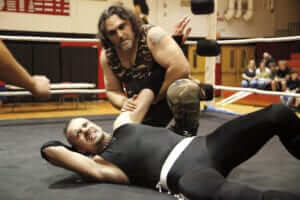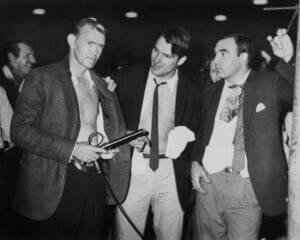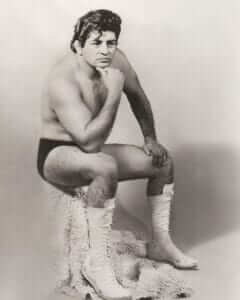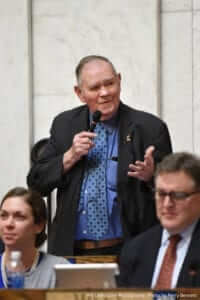For more than two decades, Saturday Nite Wrestlin’ brought outlandish characters and over-the-top action into homes across West Virginia.
Richie Acevedo did not doubt his father’s stories about being Fidel Castro’s bodyguard.
To his young mind, the evidence was all there. There was the star tattoo on his father’s left hand, which he claimed was the secret brand of the Communist revolutionary’s inner circle. He also fit the part. Small but brawny, Angel Acevedo had a wild mane of thick black hair, an equally thick accent, an unruly beard, and the gaze of a man possessed. But perhaps most convincingly, all the adults in Richie’s life also seemed to believe his dad’s stories.
From 1969 until 1973, Angel regularly appeared in homes all over West Virginia as part of Saturday Nite Wrestlin’, broadcast live from the studios of WOAY-TV in Oak Hill. Known only to fans as “Assassin No. 1,” one-half of the fearsome tag team known as “the Cuban Assassins,” he was one of the program’s most ruthless characters, willing to take whatever means necessary to win a match.
But Angel’s down-and-dirty antics did not win him many fans, especially in an America where the Cuban Missile Crisis remained a not-yet-distant memory. Richie, now 46, remembers sitting in the auditorium where the show was taped and hearing spectators holler violent threats at his father. “I thought my dad was one of the most dangerous men in the world,” he says.
Angel, like many professional wrestlers of his generation, never broke character, even outside the ring. “What he told us was what he told everybody else,” Richie says. It wasn’t until his teenage years that Richie began to ask questions. He eventually found out his father actually hailed from Puerto Rico and had never met Fidel Castro. He also learned that Raul, the man he’d been raised to think was his uncle, was actually just his father’s tag-team partner.

Richie Acevedo followed in his father’s
footsteps and became a wrestler.
(Photo courtesy of Richie Acevedo)
You might expect Richie to be bitter about these revelations. He’s not. When he got old enough, he became a professional wrestler, too. Although he did not devote his life to the sport in quite the same way as Angel, he still spent decades bouncing between ropes and jumping off turnbuckles.
Richie says he understands his father’s deceptions now. He had a character to portray and a story to tell, and was willing to do whatever was necessary to keep fans invested. “Magicians have known this for a long time,” he says. “The word ‘fake’ is irrelevant.”
“Don’t let those people cuss on the air.”
Professional wrestling, for all its artifice, has roots in reality. It began as a sideshow attraction in the 19th century. These were, for the most part, true athletic competitions—a direct outgrowth of Greco-Roman and “catch-as-catch-can” grappling, often featuring a traveling strongman going up against audacious locals. It usually wasn’t much fun to watch. A single match could last for hours. Competitors seldom left the mat as they shifted from one submission hold to another.
In an effort to liven things up for the crowd—and make more money—one 1920s sideshow act known as the Gold Dust Trio began fixing its matches. Wrestlers Ed “Strangler” Lewis and Joseph “Toots” Mondt, with help from manager Billy Sandow, adopted outlandish personas and began scripting dramatic near-defeats and comebacks. Since they weren’t actually trying to hurt one another, they could work together to make fights seem more violent than ever.
By the end of the ’20s, there was a clear distinction between the two varieties of wrestling: the legitimate competitive version and the scripted “professional” version. While it is sometimes suggested fans in the early days did not know professional wrestling was scripted, newspaper and magazine clippings reveal a winking acknowledgment of what was really happening in the ring. Fans weren’t too naive to realize wrestling was “fake”—they just didn’t care.
Wrestling came to television early in the medium’s history. KTLA of Los Angeles, California, began broadcasting matches as early as 1946. Promoters initially worried television would hurt ticket sales to live matches, but the opposite proved true. Television offered something traveling shows never could: an opportunity to create ongoing storylines and feuds between wrestlers. This made fans more invested in their favorite characters so, when the wrestlers came to their towns, they flocked to see their heroes in person.
Wrestling came to WOAY-TV in 1954. A station in Columbus, Ohio, was already broadcasting live wrestling, which a station in Huntington, West Virginia, picked up and re-aired with great success. WOAY’s owner Robert Thomas smelled an opportunity and struck a deal with a band of wrestlers who regularly performed at the Memorial Building in nearby Fayetteville. The wrestlers would get 90 minutes of free airtime. In return, the station got free content as well as proceeds from advertising revenue, ticket sales, and concessions sales. Bob Kent, the manager of the Memorial Building, agreed to be the program’s host. But after the first night, when a flying chair knocked over his announcer’s desk, Kent told Thomas he would have to find another emcee. Thomas had just the man for the job.
About a year earlier, Thomas’s father had discovered a boy named Shirley Love singing in the choir of the local Methodist church and got the honey-voiced youngster to drop by the station for an audition. Soon Love was working the microphone on WOAY-FM, doing public service announcements, station breaks, and newscasts. He began working at the company’s TV station, too, manning the microphone boom and cranking the homemade teleprompter.
Now Love, still in his early 20s and with little broadcasting experience, was being offered a high-profile job. He didn’t want it. “I said, ‘Mr. Thomas, I can’t do that. I don’t know anything about wrestling,’” Love remembers. “He said, ‘All you’ve got to do is describe what they’re doing.’” So, with his blonde hair perfectly coiffed, Love stepped in front of the cameras to host the second-ever episode of Saturday Nite Wrestlin’. He would continue hosting the show until its finale in 1977.

Shirley Love, left, takes one for the team.
(Photo courtesy of Shirley Love)
Despite his initial reluctance, it wasn’t long before Love was getting in on the act. One night, when wrestlers staged a very real strike against promoter–wrestler Jan Madrid and refused to perform, WOAY instead devoted the entire night’s program to an impromptu grudge match between Madrid and one of the auxiliary police officers hired to provide security for the event. It ended with an enraged Madrid grabbing both Love and co-host Sandy Higgins by their shirts—which, unknown to viewers, had been pre-slashed with razor blades—and ripping them off.
Now naked to the waist except for his sport coat, Love picked up his microphone. “I said ‘Sandy, I come out here and try to be as dignified as I can. This is humiliating. Look at me. I don’t know about you but I’m going home.’” The show only ran a half-hour short that night. By the next week, the strike was settled and it was back to the regularly scheduled entertainment.
One of the show’s most popular features was Love’s interviews with spectators between matches. While the action in the ring was prearranged, these provided truly unscripted entertainment. One night Love complimented a young boy on his coonskin cap. “He said, ‘Grandpa found it in the trash dump!’”
Another time, a man from Prince bragged he’d killed 12 squirrels on the first day of squirrel season. “I said, ‘No, you only killed four.’ He said, ‘No, Shirley. I killed 12. We fried four and I got the others in my sister’s freezer.’” It wasn’t until Love gingerly pointed out the state’s four-squirrel bag limit that the man’s count suddenly changed. Love later learned the local game warden was watching that night. “He fell off the couch laughing. He said, ‘I couldn’t have arrested that guy, he was so serious.’”
Sometimes even the most unassuming interviewees could cause trouble. One Saturday, Love noticed Madrid flick sweat on an elderly heckler. She was first in line for an interview when the match was over. “She looked like a little old Sunday school teacher. I said, ‘What do you think of Jan Madrid?’ She said, ‘I’d like to smack that son of a b—h right in the mouth.’
“The boss would always tell me, ‘Don’t let those people cuss on the air. I could lose my license.’” It was an ongoing struggle.
Wrestlin’ gets real
Unlike Richie Acevedo, Jan Madrid’s son Monty was in on the act—literally. “They called me ‘the booker.’ Dad would let me carry a briefcase to the matches. That way I felt included. It was my little make-believe thing,” says Monty, now 53.

Jan Madrid
(Photo courtesy of Shirley Love)
Monty was not much of a wrestling fan, though. He was a shy and nervous kid. Even though he knew everything was prearranged, he’d hide in the locker room or at the back of the auditorium during particularly brutal matches.
Things were much different outside the ring, however. “Wrestlers were my playmates growing up,” he says. He remembers dinners at his house with all the WOAY wrestlers, since the good guys and bad guys couldn’t be seen together in public. “Everybody was friends. Gosh knows it cost a fortune to feed all those wrestlers,” he says.
Sometimes a wrestling bear would show up. Whoever was scheduled to wrestle the creature that night would earn its trust by feeding it Little Debbie Oatmeal Creme Pies in the Madrids’ backyard. “It would just grab me up and put me in its paws and just roll me around the yard. It was the sweetest thing in the world,” Monty says. “Growing up like that isn’t the real world.”
But as Monty would find out, real life has an unfortunate tendency to infringe on make-believe. Jan Madrid always wrestled as a villain, or “heel.” That way, the wrestlers he booked always had a bad guy to play against. He portrayed himself as a cocksure, arrogant immigrant “from parts unknown.” “He would talk about his country versus America. He was an American-born citizen, of course,” Monty says.
It was all scripted, but the bad feelings he created among fans were very real. Monty remembers getting threatening phone calls at the house. More than once, disgruntled viewers mailed the Madrids receipts for new televisions—seeking reimbursement for the TVs they had shot in rage. “We’d come out many times, all four tires slit, sugar in the gas tank,” Monty says. “It cost a lot of money, being a villain.”
It wasn’t just the fans. In 1969, the West Virginia state government came after the wrestlers—who were listed by both their ring names and given names in court documents—of WOAY. On a Monday night in August, promoter Warren Schernbach had booked eight of Saturday Nite Wrestlin’s most popular wrestlers—including Jan Madrid and the Cuban Assassins—at the Bluefield Auditorium for a show benefiting local church and school groups. But then the police showed up. They rounded up all the wrestlers, along with Shernbach and referee Larry Swiger, and placed them under arrest. The charges: wrestling, refereeing, and promoting without a license.
Since Shernbach, Swiger, and the wrestlers had not paid their Athletic Commission dues, West Virginia Athletic Commissioner Doug Epperly contended they were violating state law. He told reporters he was hesitant to stop the event, especially since it was a charity event. “However, fair is fair,” he said.
Each of the men posted his $280 bond and was released. Schernbach maintained everyone’s innocence from the start. “The commission is trying to deprive us of our right to entertain the public,” he told a reporter with the Beckley Post-Herald. “Legally, we are entertainers. Not athletes.”
The gang of 10 was scheduled to appear before Mercer County Magistrate Court but, before that could happen, their lawyer, W. Dale Greene, made an appeal to the West Virginia Supreme Court of Appeals to prohibit further proceedings on the charges. “The petitioners are showmen, actors, artist thespians, not engaged in any contest of strength but rather engaged in the thespian arts of facial grimaces, make-believe, mat pounding, and use of all the props,” Greene wrote in his memorandum. “While the petitioners may have billed themselves as wrestlers, a rose is a rose and the public at large knows it.”
The high court granted a hearing on the matter, barring any proceedings on the misdemeanor charges until a ruling was issued. Newspapers lose the thread of the story there, and court documents are nowhere to be found. But an entry deep in the Supreme Court’s daily ledger, recorded January 23, 1970, shows that judges dismissed the case. The Athletics Commission evidently decided not to pursue the charges further. The reason behind this change of heart is lost to history.
The Athletic Commission also came knocking on WOAY’s door early on in Saturday Nite Wrestlin’s history, threatening to shut down the broadcast unless Thomas paid his fees. The station owner responded by changing the spelling on the marquee from Wrestling to Wrestlin’ and adding a disclaimer to the beginning of the broadcast: “Pre-arranged for your entertainment. This is not an athletic event.”
The changes satisfied the government, but Love says it didn’t have much of an effect on the fans. “The people didn’t pay attention to it,” Love says. “They got right into it.”
Down for the count
Saturday Nite Wrestlin’ came to an end in a deservedly dramatic fashion. In September 1977 a generator overheated, caught fire, and burned WOAY’s studios to the ground. The station, scrambling to get back on air, moved its operations next door into the auditorium where matches were broadcast. When everything was back up and running two months later, WOAY had nowhere to host its wrestling program and lacked the equipment to do a remote broadcast. It was the end of a 23-year run. “A year longer than Gunsmoke,” Love says.

Delegate Shirley Love
(Photo by Perry Bennett,
WV Legislative Photography)
There’s no way to really know how popular Saturday Nite Wrestlin’ was during its run. Thomas, a consummate penny pincher, refused to pay for Nielsen and Arbitron ratings. But in 1972 he hatched a scheme to get his own demographic data: he convinced Love to run for a spot at the Democratic National Convention. Since it was a statewide election based mostly on name recognition, Thomas knew he could tell where his station was most popular by seeing which counties gave Love the most votes. Love came in ninth out of nine delegates, but was the top vote-getter for Nicholas, Clay, Fayette, and Raleigh counties.
For Love, it was an introduction to a whole new kind of bloodsport. He ran several more times for the Democratic National Convention and, in 1994, he was elected to the West Virginia State Senate. He served 15 years in the chamber before retiring. Then, in 2017 and at the age of 83, he was sworn in for his first term in the West Virginia House of Delegates.
Love has now spent longer as a politician than he was a wrestling announcer. But he knows Saturday Nite Wrestlin’ will be his legacy. “We could go anywhere right now and if we met 10 people, eight of them—if they’re over 40—would say ‘I used to sit on Grandpa’s lap and watch you,’” he says. “It was everybody’s Saturday night opera.”











Leave a Reply